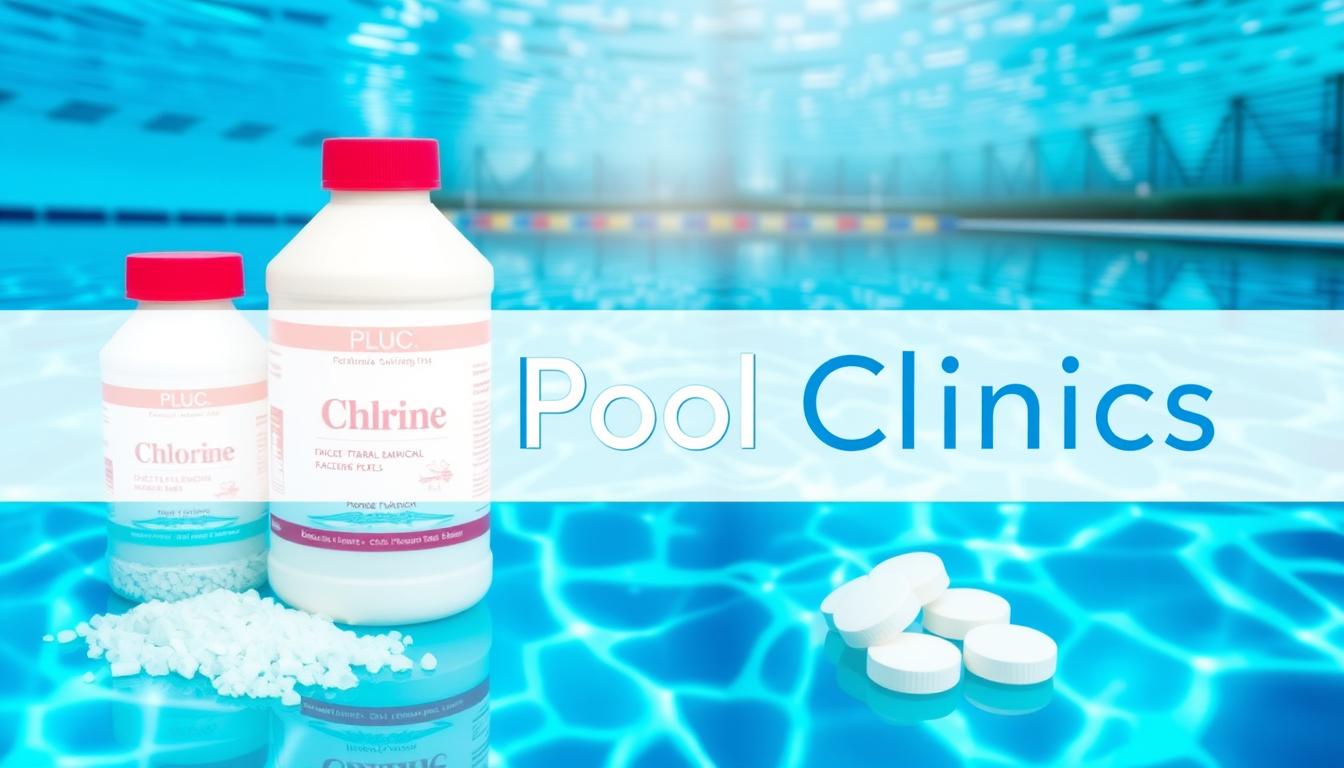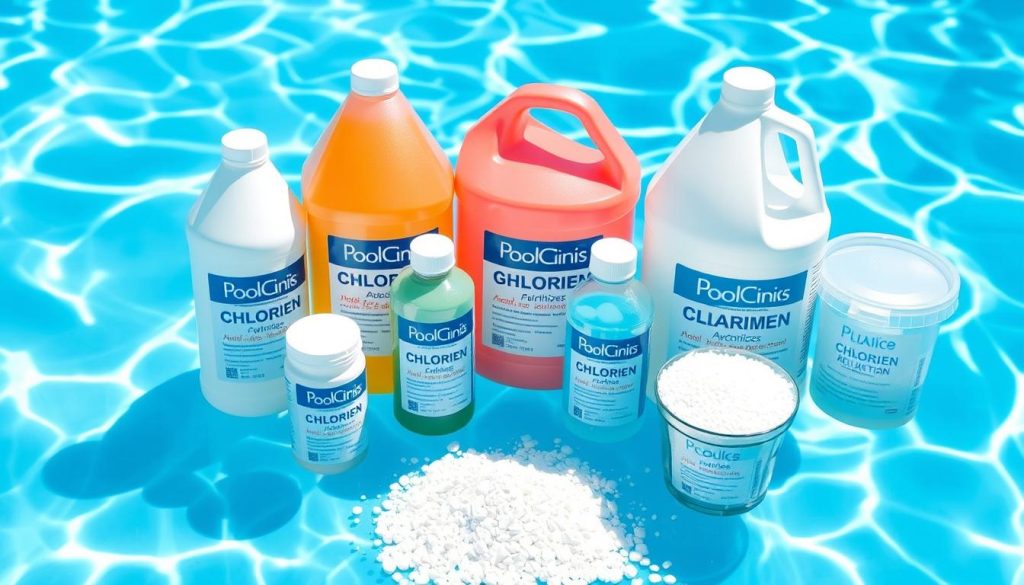
Pool owners aim for clean, healthy, and inviting swimming pools. Proper pool water treatment prevents harmful bacteria and algae growth. Chlorine is the top choice for pool sanitizers due to its effectiveness.
Various chlorine compounds are available in the market. Understanding their differences helps keep pools sparkling clean. Chlorine is effective, affordable, and easily accessible for pool maintenance.
Chlorine targets and eliminates microorganisms in the water. It acts as an oxidizer, burning up organic contaminants. These include leaves, pollen, dirt, lotion, body oils, and sweat.
Four main pool chlorine options exist: sodium hypochlorite, calcium hypochlorite, trichlor, and dichlor. Each type has unique characteristics, advantages, and drawbacks. Chlorine can be stabilized or unstabilized, with stabilized containing cyanuric acid.
Saltwater pools offer an alternative method. They use a saltwater chlorine generator (SWG). This device transforms salt into chlorine granules, maintaining proper levels.
Key Takeaways:
- Chlorine is the most popular pool sanitizer due to its effectiveness, affordability, and availability.
- There are four main types of chlorine used in pools: sodium hypochlorite, calcium hypochlorite, trichlor, and dichlor.
- Chlorine eliminates harmful microorganisms and oxidizes organic contaminants in pool water.
- Chlorine can be stabilized (containing cyanuric acid) or unstabilized.
- Saltwater pools use a saltwater chlorine generator to produce chlorine from salt.
Common Forms of Chlorine for Pool Sanitation
Chlorine is the top choice for keeping pools clean and safe. Four main types of chlorine are used in swimming pools. Each has its own features and perks.

Liquid Chlorine (Sodium Hypochlorite)
Liquid chlorine is cheap and easy to find. It breaks down quickly in sunlight and has 10-12% chlorine strength. This form dissolves fully in water, making it simple to use.
However, it’s bulky and heavy. Its strength fades fast, so you’ll need to add it more often.
Calcium Hypochlorite (Cal-Hypo)
Cal-hypo comes in granules or tablets. It has 45-78% chlorine strength, higher than liquid chlorine. Many use it for shock treatments and regular cleaning.
Over time, cal-hypo raises calcium levels in pool water. This may require extra care.
Trichloro-s-triazinetrione (Trichlor)
Trichlor tablets or pucks dissolve slowly. They have the highest chlorine strength at 90% or more. People often use them in floating dispensers or automatic chlorinators.
Trichlor increases cyanuric acid levels in water. It can also lower pH and total alkalinity. Regular checks and adjustments are needed.
Sodium Dichloro-s-triazinetrione (Dichlor)
Dichlor comes in granules and tablets. It dissolves fast and has 55-63% chlorine strength. Its near-neutral pH helps keep water balanced.
This type is easy to handle and store. Like trichlor, it raises cyanuric acid levels over time.
| Chlorine Type | Chlorine Strength | Form | Stabilized |
|---|---|---|---|
| Liquid Chlorine (Sodium Hypochlorite) | 10-12% | Liquid | No |
| Calcium Hypochlorite (Cal-Hypo) | 45-78% | Granular or Tablet | No |
| Trichloro-s-triazinetrione (Trichlor) | 90%+ | Tablet or Puck | Yes |
| Sodium Dichloro-s-triazinetrione (Dichlor) | 55-63% | Granular or Tablet | Yes |
Knowing these chlorine types helps you pick the best one for your pool. Think about strength, water chemistry effects, cost, and ease of use.
Using your chosen chlorine correctly keeps your pool clean and safe. This ensures everyone can enjoy a great swim.
What Type of Chlorine is Used in Pools: Pros and Cons
Pool owners have several chlorine options for their swimming pools. Each type has unique advantages and disadvantages. The choice affects water chemistry and maintenance costs.
Evaluating Chlorine Strength and Effectiveness
Chlorine strength varies among types. Trichlor has 90%+ chlorine content, while liquid chlorine has 10-12%. Granular chlorine, like calcium hypochlorite, contains about 65%.
Stabilized chlorines last longer due to cyanuric acid. This acid protects against UV breakdown. However, too much can reduce chlorine’s sanitizing ability. Regular monitoring is crucial.
Considering the Impact on Water Chemistry
Different chlorines affect pool water chemistry differently. Cal-hypo increases calcium hardness, while trichlor lowers pH and alkalinity. Liquid chlorine and dichlor have minimal impact.
| Chlorine Type | Effect on pH | Effect on Alkalinity | Effect on Calcium Hardness |
|---|---|---|---|
| Liquid Chlorine | Slight increase | Minimal | None |
| Calcium Hypochlorite | Increases | Increases | Increases |
| Trichlor | Decreases | Decreases | None |
| Dichlor | Slight decrease | Slight decrease | None |
Comparing Costs and Convenience
Cost and convenience matter when choosing pool chlorine. Liquid chlorine is cheapest but bulky with a short shelf life. Trichlor and dichlor tablets are easy to handle but costlier.
Pool owners often utilize a combination of chlorine tablets and granules based on their specific pool maintenance needs. The efficiency of chlorine tablets is pronounced when pools are stable and maintained consistently, while pool owners may use chlorine granules to quickly rectify chemical imbalances caused by external factors.
Your chlorine choice depends on budget, pool size, and maintenance preferences. Understanding each option’s pros and cons helps you make an informed decision. This ensures a clean, safe, and well-maintained pool.
Conclusion
Choosing the best pool chlorine requires understanding different types and their impacts. Liquid chlorine is cost-effective but needs careful handling. Chlorine tablets are safer but contain stabilizers and may release harmful gases.
Consider factors like investment and maintenance when deciding between chlorine and saltwater pools. Saltwater pools have higher upfront costs but lower long-term expenses. They offer gentler water but may damage certain pool materials.
Your pool’s specific needs determine the most suitable chlorine option. Consider indoor or outdoor location, water chemistry, and budget. Regular testing of chlorine levels is crucial for a safe swimming environment.
By understanding each chlorine option’s pros and cons, you can make an informed decision. Take into account your pool’s unique characteristics when choosing the best chlorine solution.







